-
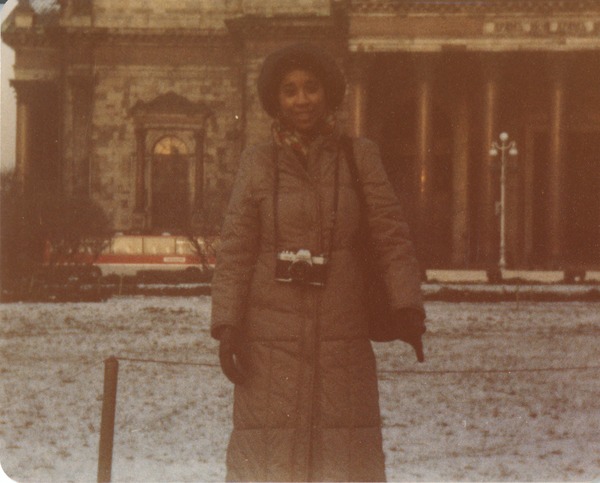
Mundelein student Frances Smith wears a long, puffy coat and a camera around her neck while standing in front of an unidentified building with tall pillars and ornate doorways on the Mundelein trip to the USSR. A colorful tour bus sits behind her and in front of the building.
-
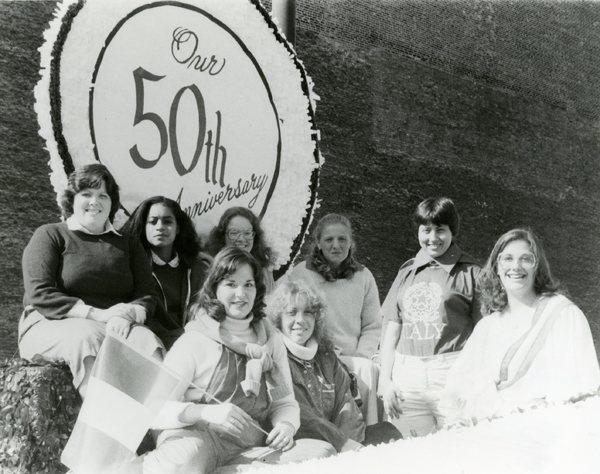
A group of students sit and pose for the camera on a parade float in a Columbus Day parade in Chicago, in front of a brick wall. The float is decorated with a large round sign that reads, "Our 50th Anniversary" for Mundelein College's 50th anniversary, and one student wearing overalls holds a tricolor flag.
-

Transcription (made by Regina Hong for the Timeline Project):
(0:00-0.07) Greetings to all of you gathered in Chicago for the Vietnam Veterans Welcome Home Parade.
(0:08-0:13) President Teddy Roosevelt, a man who had himself led troops into battle, once said: “A man who is good enough to shed his blood for his country, is good enough to be given a square deal afterward.”
(0:19-0:28) Clearly, the welcome home received by many of our brave men and women who served in Vietnam was less than they deserved, and that’s putting it mildly.
(0:29-0:31) Today, however, Americans are making up for that.
(0:32-0:41) All over our country, citizens are joining together to honor those who served their country and the cause of freedom in South Vietnam.
(0:42-0:45) In 1984, I helped dedicate the Vietnam Veterans Memorial in our nation’s capital.
(0:46-0:54) And on Memorial Day and other occasions, Vietnam veterans have been singled out as they should be for their service.
(0:55-0:58) Your parade in Chicago is a fine example of what I’m talking about.
(0:59-1:12) I hope that all those who participate, and all those veterans throughout our country, will stand a little taller knowing that the people of Chicago and indeed all America, are grateful, and have not forgotten.
(1:13-1:17) This parade, a welcome home event, is simply taking care of unfinished business.
(1:18-1:25) A goodwill expressed to our Vietnam veterans by this celebration will help heal old wounds.
(1:26-1:39) Yet, even as those wounds heal, let us re-state firmly and unambiguously the book on the Vietnam War will not be closed, until the final pages on the prisoners-of-war and the missing-in-action have been written.
(1:40-1:53) Cheering on our veterans is something America wants to do; keeping faith with those whose names are found on the POWMIA list is our duty.
(1:54-1:59) Indeed, in the last year, over 50 of these brave men were returned to their final burial on U.S. soil.
(1:58-2:02) In recent years, many have observed an awakening of patriotic spirit across America.
(2:03-2:07) It can be seen in events which draw people together to help the less fortunate.
(2:08-2:13) It is evident in our colleges and universities and on main street America.
(2:14-2:20) Next month, we will be re-dedicating Miss Liberty herself, standing there proud and tall in New York Harbor, lifting high her torch of freedom.
(2:21-2:31) It’s appropriate in such times as these, when we recognize how much we have to be grateful for, that we turn to our veterans and offer them thanks.
(2:31-2:40) To all of you who are marching, I salute you. You have done us proud. God bless you.
-
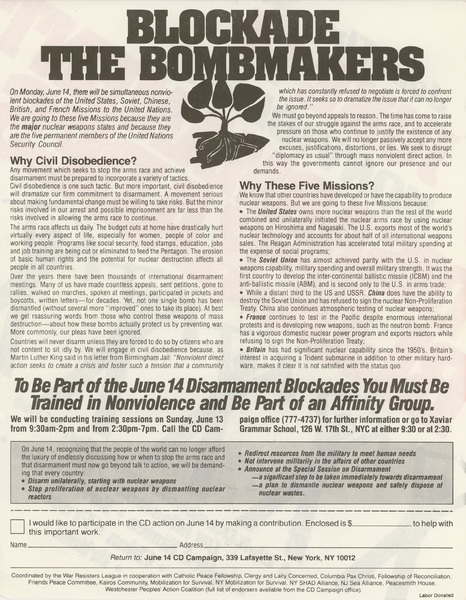
This flyer features the words "Blockade the Bombmakers" in capital block letters and an image of a seedling immediately below it. Blockade the Bombmakers was a series of nonviolent blockades of the United States, Soviet, Chinese, British and French Missions to the United Nations.
-
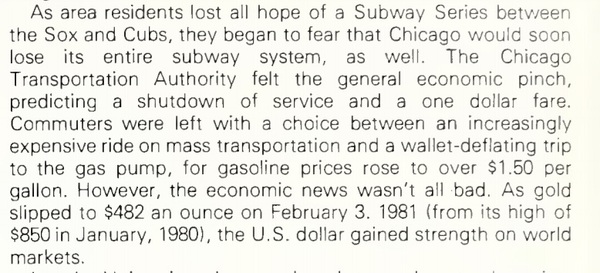
Chicago commuters grew concerned about the possibility of Chicago losing its "entire subway system" as the Chicago Transport Authority was affected by the general economic contraction.
-
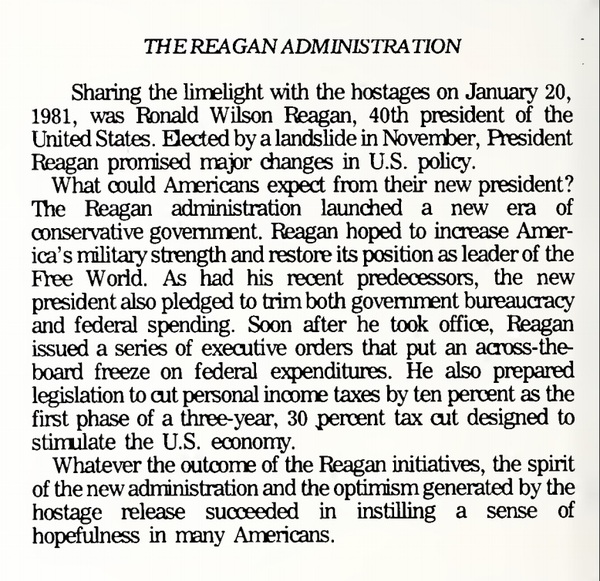
This column in the 1981 Loyolan yearbook keenly considered the policies of the Reagan administration and its future directions.
-

This short paragraph in the Loyolan's round-up of the year's events touches on the popular soap opera, Dallas, which ended its season on a cliffhanger with the shooting of its main character by an unknown assailant. (image cropped)
-
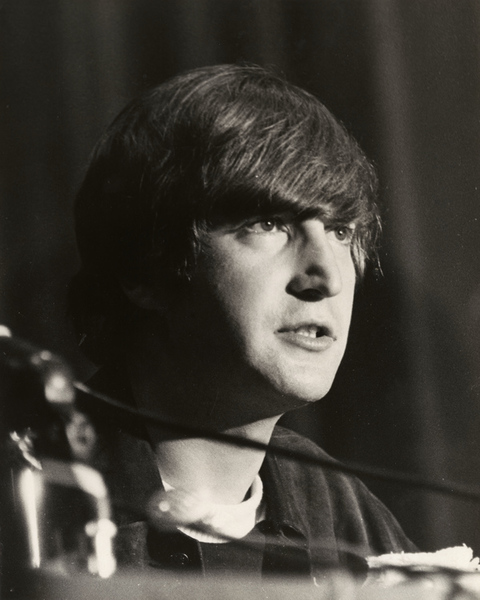
John Lennon of the Beatles during a press conference at the George Washington Hotel in Jacksonville.
The band did not book rooms at the George Washington Hotel in protest of the hotel's segregation policy. Furthermore, they had refused to perform at the Gator Bowl until they were assured that the audience would not be segregated by race at the concert.
-
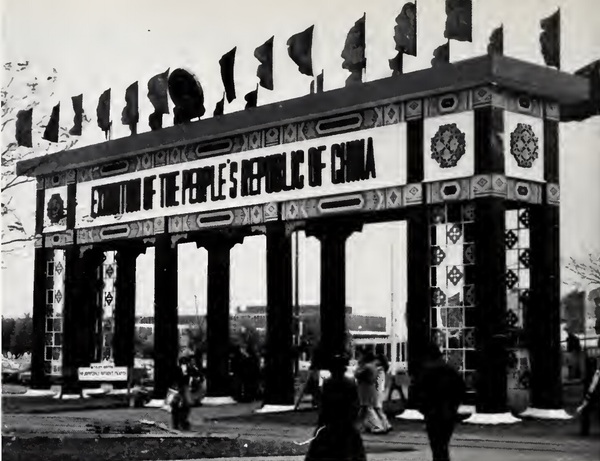
A towering structure with several flags on the roof, decorative motifs and the words "Exhibition of the People's Republic of China" at Navy Pier, Chicago in November 1980.
The signing of the Sino-US Trade Exhibitions Agreement in 1979 led to the hosting of three exhibitions in San Francisco, Chicago and New York City by the People's Republic of China for the first time. Each exhibition showcased aspects of China's industries and culture. America also reciprocated with an exhibition of its own in Beijing.
-
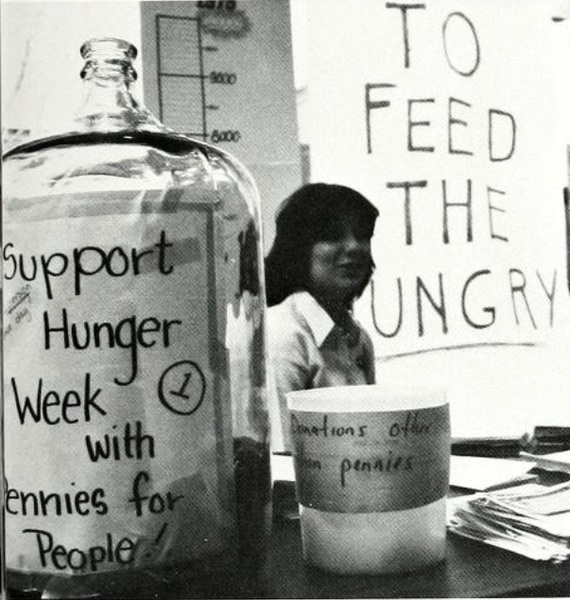
A student sits at a table in front of a poster with the words "To Feed the Hungry." A glass jar is in the foreground of the picture, with a piece of paper bearing the words "Support Hunger Week with Pennies for People" taped to it. Beside the glass jar is another smaller round container.
-
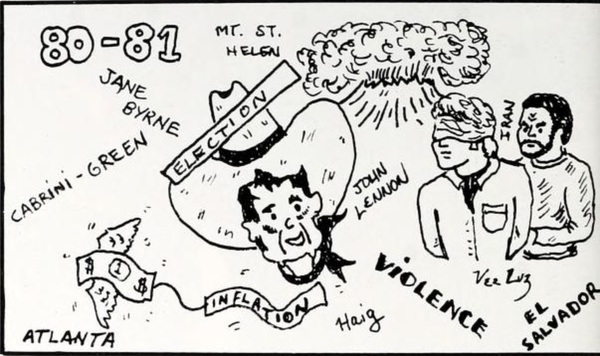
This comic in the 1981 Loyolan yearbook depicts some of the notable events of the year, such as the "war of words" between Mayor Jane Byrne and Richard Daley, the eruption of Mount St. Helen, the election of Ronald Reagan, Americans being held hostage in Iran, the murder of ex-Beatle member John Lennon, inflation, and the violence in El Salvador that resulted in the murder of American nuns in December 1980.
More details can be found in the Loyolan 1980, pages 108-110.
-
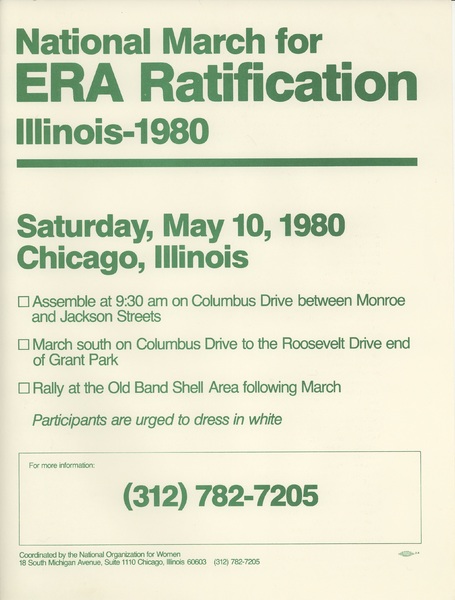
This flyer contains details on the National March for ERA Ratification held in Chicago, Illinois on May 10, 1980. There are instructions for participants on the assembly point, actions to take, and dress code.
Despite local efforts, the ERA was not ratified in Illinois until 38 years later on May 30, 2018.
-
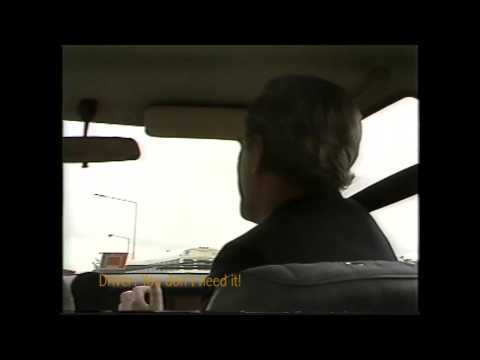
In 1986, Loyola awarded Ignacio Ellacuría, S.J. with an honorary doctorate of laws. While in Chicago for the ceremony, he gave a series of press conferences on the current political state of El Salvador under President Duarte, that country’s first civilian president after a decade of military rule. These tapes document Ellacuría’s few days at Loyola, from the moment he arrived to the final conferral of an honorary degree.
In this clip, filmed during the car ride to Loyola from the airport, Ellacuría reflects on El Salvador’s current president, José Napoleon Duarte. He explains that the president is disillusioned because he believes he has control over the country when, according to Ellacuría, it is the Army and U.S. government who call the shots. Discussion soon turns to the release of President Duarte’s kidnapped daughter Ines and the upper hand enjoyed by the Salvadoran military.
For more information, check out "The Ellacuría Tapes: A Martyr at Loyola" exhibit at: http://www.lib.luc.edu/specialcollections/exhibits/show/ellacuria-tapes
-
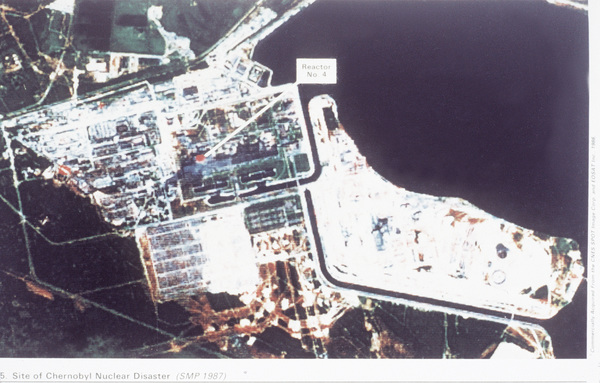
A high-altitude view of the Chernobyl nuclear reactor accident site.
The 1986 disaster at the nuclear power plant in Chernobyl, Ukraine resulted in several radiation-related fatalities. The tragedy led to significant changes in industry partnerships and safety culture.
-
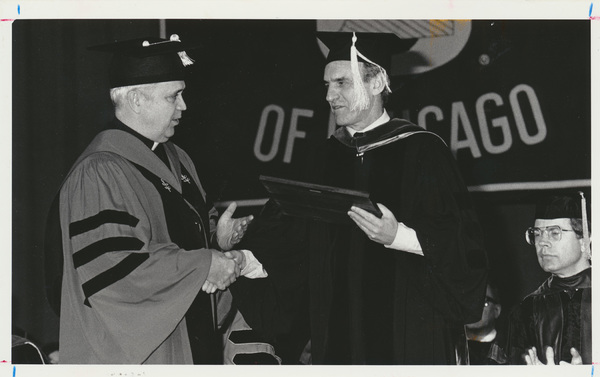
Ignacio Ellacuría, S.J. (left), receives an honorary degree from Loyola University of Chicago President Raymond Baumhart, S.J. (right), during the 1986 Commencement.
Until his murder in 1989, Ellacuría served as the rector of University of Central America (UCA) and was one of the most outspoken advocates for peace negotiations during El Salvador's civil war.
-
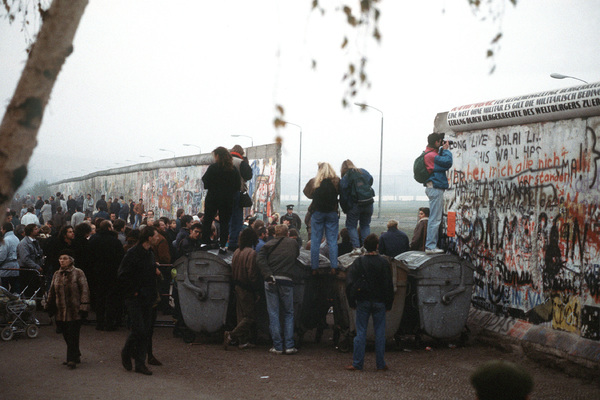
West German citizens gather at the newly created opening in the Berlin Wall at Potsdamer Plaza. Graffiti can be seen on a section of the wall.
-
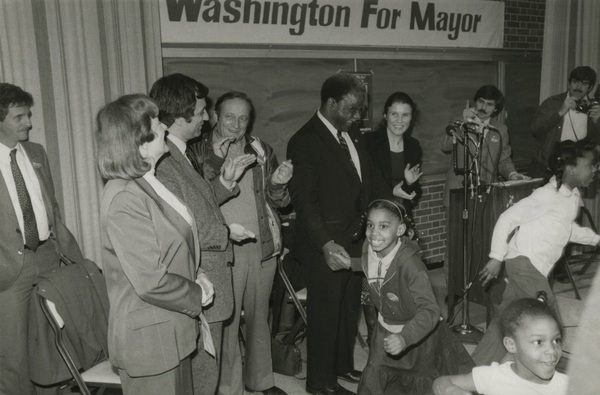
Mayorial campaign rally at Mundelein for Harold Washington. Alderman David Orr, former Mundelein faculty member is standing at the podium. A banner with "Washington for Mayor" can be seen in the background.

















